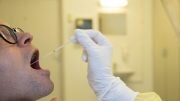In order to avoid the further national spread of the coronavirus infection, the National Institute of Public Health (FHI) recommends that the current measures are continued, especially to prevent mass infection incidents.
The institute’s most recent report looks at the period up to November 1, and provides the following key conclusions:
1. There is a high risk of local flare-ups of infection. The whole community must prepare for local outbreaks throughout the autumn.
2. There is a moderate risk that local outbreaks will develop into a regional spread of infection and a new national wave of infections.
Mass infection
According to the FHI, it may appear that mass infection instances “are an important driving force for the COVID-19 pandemic.”
“Several mass infection events in a row can lead to the epidemic ending out of our control. Prevention of such incidents will therefore have a major impact on the epidemic.
“The risk of covert spread and mass infection events makes the risk assessments uncertain.
“If young adults are infected in social contexts, large outbreaks can develop,” the FHI warned.
There are now significantly more infectious people in the country than before the summer.
The FHI thinks that 80% of the spread of infection could occur from only 10–20% of those infected, in many cases, as part of mass infection events.
Importance of anti-infection measures
In its risk assessment, the FHI recommends that the national core anti-infection measures are continued.
The key efforts include good hygiene, keeping distance, testing, infection detection, entry quarantine from countries with significantly larger epidemics than Norway, and controlled visits to health institutions.
“The population must be prepared for the measures to last a long time,” the FHI wrote.
The municipalities must be strengthened when it comes to testing, preferably with rapid tests, and municipal doctors and infection detection teams must prepare for long-term preparedness.
In the event of regional flare-ups, increasingly stricter measures can be introduced on a step by step basis, adapted to the local situation.
The larger the area for which it is relevant to introduce measures, the more important it is to ensure that the measures are not more intrusive than necessary.
People should be encouraged to use an infection detection app that can support manual infection detection, the FHI concluded.
© NTB Scanpix / #Norway Today





Be the first to comment on "Norway’s health institute publishes new corona assessment: “High risk of local outbreaks”"